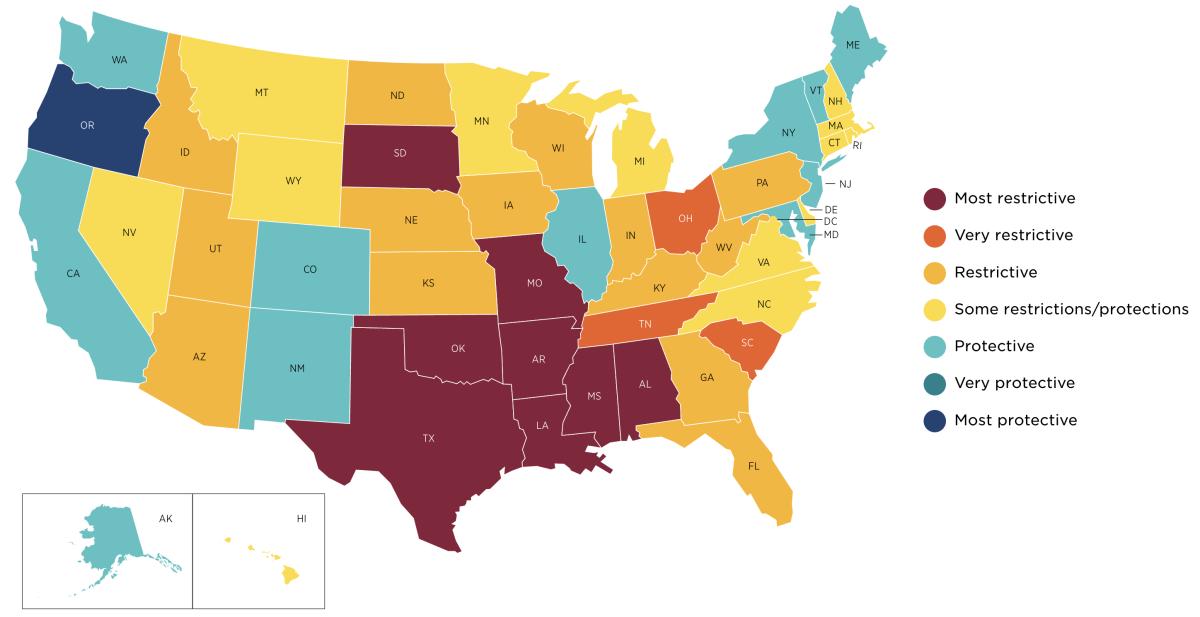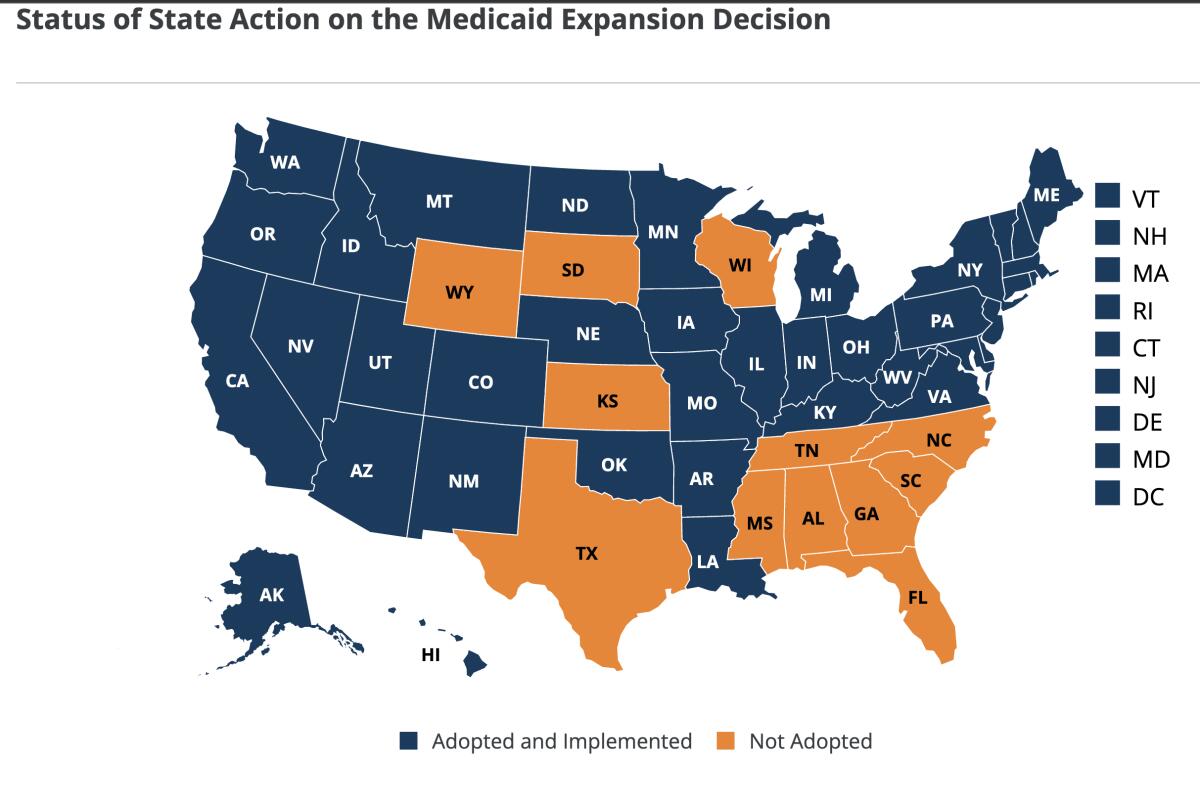Column: With a noxious family leave proposal, GOP pretends it’s still pro-women despite antiabortion laws

- Share via
Having achieved its long-held goal of eviscerating women’s reproductive health rights, the Republican Party is now hard at work pretending that it’s about to enter a new era of pro-women and pro-family policy.
A more transparently mendacious claim is hard to imagine.
Arguments are common that the Supreme Court’s recent ruling in Dobbs vs. Jackson Women’s Health Organization, overturning the half-century guarantee of abortion rights embodied in the 1973 Roe vs. Wade decision, sets the stage for a torrent of pro-family GOP policies.
This country desperately needs paid leave, not just for new babies, but when workers get sick or to care for family members who get sick. This proposal is not that.
— Kathleen Romig, Center on Budget and Policy Priorities, on Sen. Marco Rubio’s New Parents Act
After the Dobbs ruling was leaked in May, a fellow at the Koch-funded Ethics and Public Policy Center asserted that allowing states to outlaw abortion “compels a greater claim on public resources to support expectant mothers facing crisis pregnancies and to seek to make all parents’ lives a little easier.”
Mississippi Gov. Tate Reeves, whose state produced the abortion ban that the Supreme Court endorsed in Dobbs, said on CNN after the ruling that “the next phase of the pro-life movement is focusing on helping those moms that maybe have an unexpected and unwanted pregnancy.”
Get the latest from Michael Hiltzik
Commentary on economics and more from a Pulitzer Prize winner.
You may occasionally receive promotional content from the Los Angeles Times.
Reeves did acknowledge, however, that “it’s not something that we have spent a lot of time focused on.”
No kidding. Red states, the epicenters of antiabortion lawmaking, could have implemented pro-family policies whenever they pleased. For the most part, they have done just the opposite.
For a good illustration, just compare the maps showing the states with the most stringent abortion laws with those that have failed to expand Medicaid under the Affordable Care Act, a key initiative to help low-income families.
There are few more wasteful and counterproductive endeavors on Capitol Hill than the Republican bloc’s efforts to undermine the Affordable Care Act.
Of the 12 red states that haven’t expanded Medicaid, 10 are listed by the Center for Reproductive Rights as those in which abortion is now illegal or that are “hostile” to abortion rights. The exceptions are Kansas, where abortion rights are protected by the state Constitution, and Florida, where abortion is legal if it’s performed during the first 15 weeks of pregnancy.
Mississippi, a non-expansion state, has the worst infant mortality rate in the country, at twice the U.S. average. Reeves was downplaying his state’s record when he said it had not “spent a lot of time” on helping mothers and families. It hasn’t spent any time on the issue.
The best illustration of GOP fakery on the pro-family front, however, comes from Sen. Marco Rubio (R-Fla.), who unveiled the Providing for Life Act, which he called a “pro-family framework,” on June 24, the very day that Dobbs was handed down.

The centerpiece of this proposal is the so-called New Parents Act, which would allow some new parents to take up to three months of paid family leave for each new child, but require them to repay the benefit by giving up some of their Social Security benefits when they retire.
This is just a reintroduction of a measure that Rubio and Sen. Mitt Romney (R-Utah) proposed last year, which itself was a rehash of a measure Rubio proposed back in 2018, which itself was an alternate version of a plan proposed by Sens. Joni Ernst (R-Iowa) and Mike Lee (R-Utah).
We’ve been following these proposals in all their permutations from the start. They all share the same flaw, which is that they are all disasters dressed up as benefits. Rubio’s plan, which is the most detailed, is also the worst, cementing his stature as a policy vacuum swathed in gabardine, as we’ve pointed out before.
None of the promoters has ever explained why family leave should be tied to Social Security, which is chiefly a retirement program, in the first place.

Every wealthy country has a program of paid family leave, except the United States, where those programs are left to states; the only national program provides only for unpaid leave for workers needing time for a new or sick child or to care for ailing or aging family members. And about half of all workers are ineligible even for that.
Contrary to Rubio’s assertion that his New Family Act would serve as a “pro-family” initiative, in fact it would undermine family resources for decades to come. Rubio hides this reality behind lies and PR misdirection.
That’s a habit of Rubio’s, as when he boasted about having “done significant damage to Obamacare” as if that was a boon to patients rather than a huge, costly drawback.
“This country desperately needs paid leave, not just for new babies, but when workers get sick or to care for family members who get sick,” says Kathleen Romig, an expert on Social Security and disability policy at the Center on Budget and Policy Priorities. “This proposal is not that. It’s just making families borrow against themselves. Not only that, but it charges them for the privilege of borrowing their Social Security benefits with really substantial interest that accrues over decades.”
The idea of government-sponsored paid family leave is gaining popularity at the state level and in Washington, where Sen.
The New Family Act is also a stalking horse for the ultimate destruction of Social Security as a bulwark against poverty in old age. One advocate of the concept of draining Social Security for family leave has boasted that it could lead Americans to “embrace” Social Security reforms tantamount to privatizing the program — something that Americans have resisted strongly in the past.
The leave proposal, wrote Carrie Lukas, the advocate, “could even be designed to improve Social Security’s financial conditions by requiring people to give up retirement benefits of greater value than the parental leave benefits they use.”
She’s right about that, though it’s obviously a drawback, not an improvement.
Let’s examine how Rubio’s plan would work, and identify its hidden costs. The plan would allow families to take up to three months of paid leave for every new child and repay it either by deferring their Social Security retirement benefits or taking a benefit cut through up to the first five years of retirement.
The Urban Institute calculated that workers would have to defer their Social Security benefits by as much as two months for every month of family leave.
That could be a particular hardship for workers in physically demanding or low-income jobs, who often don’t have the flexibility to put off Social Security retirement much past the minimum claiming age of 62. (Workers who claim retirement earlier than their normal retirement age — 67 for those born in 1960 or later — already have to suffer a lifetime reduction in monthly benefits.)
The Rubio plan’s benefits would exact a heavy cost. The Urban Institute estimated that parents with moderate incomes of about $50,000 a year would receive about $5,300 on average in benefits for each three-month leave, but would lose about $15,100 in lifetime retirement benefits in exchange.
Advocates for seniors and the middle class have been warning for weeks that the Republican drive to cut taxes for the wealthy is the prelude to a larger attack on Social Security and Medicare.
That amounts to more than 3% of expected retirement benefits, meaning that parents who took three months of family leave for each of three children would be giving up nearly 10% of their retirement income.
What’s most cynical about the Rubio plan is that it treats the neediest Americans the worst.
“The very people who are most likely to need paid leave,” says Vicki Shabo, senior fellow for paid family leave policy and strategy at the think tank New America, “are the same people working in low-paid jobs without retirement benefits and where their primary retirement security in old age is going to come through their Social Security payments. For them, working longer may not be an option because of the kind of work they’ve done.”
The plan, Shabo adds, would disproportionately harm “low-paid women and workers of color, who would be least likely to have access to paid leave when they have a child.”
A few further details of the Rubio plan make it even more worthless. Only parents who have worked for two years or more would be eligible, which leaves out anyone still in school or college or just beginning a working career. They’d still be on their own.
An obscure provision of the measure would require the Social Security system to claw back any leave benefits that haven’t been repaid from retirement checks — say because the beneficiary died before reaching retirement or before the full amount was repaid.
The proposal doesn’t explicitly say how that recovery would be accomplished, but it defines the unrecovered sums as Social Security overpayments, and the Social Security Act requires overpayments to be recovered from a worker’s estate. In other words, a family already strapped by the loss of an earner would be further harmed by a bill from the Social Security Administration.
So much for the Republican claim to be looking out for women and families. Rubio has the gall to assert that his plan represents a commitment to “adopt pro-life policies that support families, rather than destroy them.” He says his Providing for Life framework “would make a real difference to American parents and children in need.”
He’s right about that, actually. It would make a “real difference” by making their lives immeasurably worse.
More to Read
Get the latest from Michael Hiltzik
Commentary on economics and more from a Pulitzer Prize winner.
You may occasionally receive promotional content from the Los Angeles Times.












